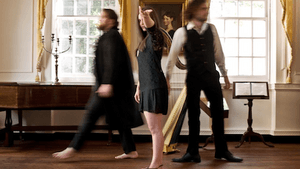Stay in the Loop
BSR publishes on a weekly schedule, with an email newsletter every Wednesday and Thursday morning. There’s no paywall, and subscribing is always free.
A shadowy journey through time and space
Philly Fringe 2016 review: Philadelphia Opera Collective's 'Shadow House'

Shadow House is one of those immersive, choose-your-own adventure plays that are a Fringe staple. When we enter the historic Powel House grounds, we're told that we can sit and watch scenes as long as we like through three floors plus the garden (but don't sit on the antique chairs), depart scenes whenever we wish, and "follow a character or follow your own impulses."
Shadow House is an opera, a daring choice for director Brenna Geffers and the Philadelphia Opera Collective (POC). POC, much like Idiopathic Ridiculopathy Consortium, has become stronger through annual Fringe productions. It is led by artistic director Michael A. Lienhard, who also performs in this piece. At Powel House's invitation, their devised work about the historic residence features original compositions by Sara Van Sciver, Christopher Colucci, Sean Lally, and POC resident composer Josh Hartman, each writing songs set in different eras.
Part of Shadow House's charm is that its stories and times merge and overlap. I worried about how music coming from various rooms and hallways would mesh, fearing a messy cacophony. Instead, the 10 performers's voices and their accompaniment, both live and recorded, blends in fascinating ways. I found that standing midway between one floor and the next allowed me to enjoy several scenes simultaneously, which would combine with an organic synchronicity reminiscent of John Cage.
"You're not supposed to be here"
All of the souls inhabiting Shadow House are apparently ghosts, though some are re-enacting real events while others, disturbed by our presence, ask, "Do you know who I am?" because they don't. Maryruth Stine plays a 1940s society woman at odds with a Jewish businessman who owns Powel House and needs to sell its treasures. She wants to preserve them, and he debates this with his son, played by Anthony Crosby.
The 1960s portion features Brendan Norton as an architect who uses a Ouija board to conjure Benedict Arnold's wife (Kristy Joe Slough), with Richard Chan as his conflicted assistant. Kayla Grasser plays a girl who recalls a field trip to Powel at age 12, whose spirit seems stuck and confused. "I can't hold on to anyone," she sings, "I can't hold on to any time." Sean Lally, Kirsten Kunkle, and Crystal Charles play other characters from different times, intersecting in eerie ways.
Echoes
The 70-minute show kept me hopping from one room to another, each choice making another impossible. Occasionally, characters engage the audience directly, sometimes leading them away to share their stories. Some of the opening night's audience was whisked away by Grasser's character into the second floor bathroom's bright lights, to talk her out of taking a fistful of pills.
Exploring is part of the show's fun, as adventurous for the performers as it is for the audience. To Geffers' credit, this cast was well prepared for the surprises of playing characters and singing while moving among unpredictable audience members. Enough scenes are repeated — though not the same way twice — that one gradually gleans the interconnected stories about the house's history, occupants, and visitors, and also appreciates the beauty of this well-preserved Colonial-era home.
Even for the eclectic Fringe Festival, the magic of Shadow House is rare.
What, When, Where
Shadow House. By Brenna Geffers and The Philadelphia Opera Collective, Brenna Geffers directed. Through September 24, 2016 at Powel House, 244 South Third St., Philadelphia. (215) 413-1318 or fringearts.com.
Sign up for our newsletter
All of the week's new articles, all in one place. Sign up for the free weekly BSR newsletters, and don't miss a conversation.

 Mark Cofta
Mark Cofta